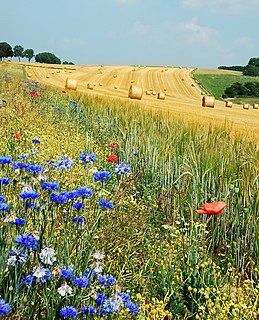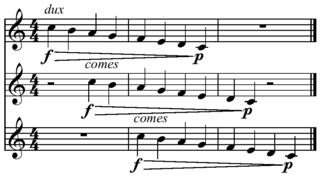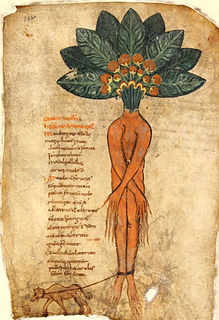| Canon by Unknown; speculated to be W. de Wycombe | |
 Harley 978, folio 11v, British Library (Harley 978, BL) | |
| Text | Unknown; speculated to be W. de Wycombe |
|---|---|
| Language | Wessex dialect of Middle English |
"Sumer is icumen in" (also called the Summer Canon and the Cuckoo Song) is the first line of a medieval English round or rota of the mid-13th century.

A round is a musical composition, a limited type of canon, in which a minimum of three voices sing exactly the same melody at the unison, but with each voice beginning at different times so that different parts of the melody coincide in the different voices, but nevertheless fit harmoniously together. It is one of the easiest forms of part singing, as only one line of melody need be learned by all parts, and is part of a popular musical tradition. They were particularly favoured in glee clubs, which combined amateur singing with regular drinking. The earliest known rounds date from 12th century Europe.
Contents
- Rota
- Translations
- Christian version in Latin
- Renditions and recordings
- Studio albums
- Film
- Television
- Parodies
- Notes
- References
- Further reading
- External links
The line translates approximately to "Summer has come in" or "Summer has arrived" ( Roscow 1999 , [ page needed ]). The song is written in the Wessex dialect of Middle English. Although the composer's identity is unknown today, it may have been W. de Wycombe. The manuscript in which it is preserved was copied between 1261 and 1264 ( Wulstan 2000 , 8).

Middle English was a form of the English language, spoken after the Norman conquest (1066) until the late 15th century. English underwent distinct variations and developments following the Old English period. Scholarly opinion varies, but the Oxford English Dictionary specifies the period when Middle English was spoken as being from 1150 to 1500. This stage of the development of the English language roughly followed the High to the Late Middle Ages.
W. de Wycombe was an English composer and copyist of the Medieval era. He was precentor of the priory of Leominster in Herefordshire. It is possible that he was the composer of the most famous tune from medieval England, Sumer is icumen in.
This rota is the oldest known musical composition featuring six-part polyphony ( Albright 2004 , [ page needed ]).

Musical composition, or simply composition, can refer to an original piece or work of music, either vocal or instrumental, the structure of a musical piece, or to the process of creating or writing a new piece of music. People who create new compositions are called composers. Composers of primarily songs are usually called songwriters; with songs, the person who writes lyrics for a song is the lyricist. In many cultures, including Western classical music, the act of composing typically includes the creation of music notation, such as a sheet music "score," which is then performed by the composer or by other instrumental musicians or singers. In popular music and traditional music, songwriting may involve the creation of a basic outline of the song, called the lead sheet, which sets out the melody, lyrics and chord progression. In classical music, orchestration is typically done by the composer, but in musical theatre and in pop music, songwriters may hire an arranger to do the orchestration. In some cases, a pop or traditional songwriter may not use written notation at all, and instead compose the song in their mind and then play, sing and/or record it from memory. In jazz and popular music, notable sound recordings by influential performers are given the weight that written or printed scores play in classical music.

In music, polyphony is one type of musical texture, where a texture is, generally speaking, the way that melodic, rhythmic, and harmonic aspects of a musical composition are combined to shape the overall sound and quality of the work. In particular, polyphony consists of two or more simultaneous lines of independent melody, as opposed to a musical texture with just one voice, monophony, or a texture with one dominant melodic voice accompanied by chords, which is called homophony.
It is sometimes called the Reading Rota because the earliest known copy of the composition, a manuscript written in mensural notation, was found at Reading Abbey; it was probably not drafted there, however ( Millett 2004 ). The British Library now retains this manuscript ( Millett 2003a ).

Mensural notation is the musical notation system used for European vocal polyphonic music from the later part of the 13th century until about 1600. The term "mensural" refers to the ability of this system to describe precisely measured rhythmic durations in terms of numerical proportions between note values. Its modern name is inspired by the terminology of medieval theorists, who used terms like musica mensurata or cantus mensurabilis to refer to the rhythmically defined polyphonic music of their age, as opposed to musica plana or musica choralis, i.e., Gregorian plainchant. Mensural notation was employed principally for compositions in the tradition of vocal polyphony, whereas plainchant retained its own, older system of neume notation throughout the period. Besides these, some purely instrumental music could be written in various forms of instrument-specific tablature notation.

Reading Abbey is a large, ruined abbey in the centre of the town of Reading, in the English county of Berkshire. It was founded by Henry I in 1121 "for the salvation of my soul, and the souls of King William, my father, and of King William, my brother, and Queen Maud, my wife, and all my ancestors and successors". The traditions of the Abbey today is continued by the neighbouring St James's Church, which is partly built using stones of the Abbey ruins.

The British Library is the national library of the United Kingdom and the largest national library in the world by number of items catalogued. It is estimated to contain 170–200 million+ items from many countries. As a legal deposit library, the British Library receives copies of all books produced in the United Kingdom and Ireland, including a significant proportion of overseas titles distributed in the UK. The Library is a non-departmental public body sponsored by the Department for Culture, Media and Sport.


















